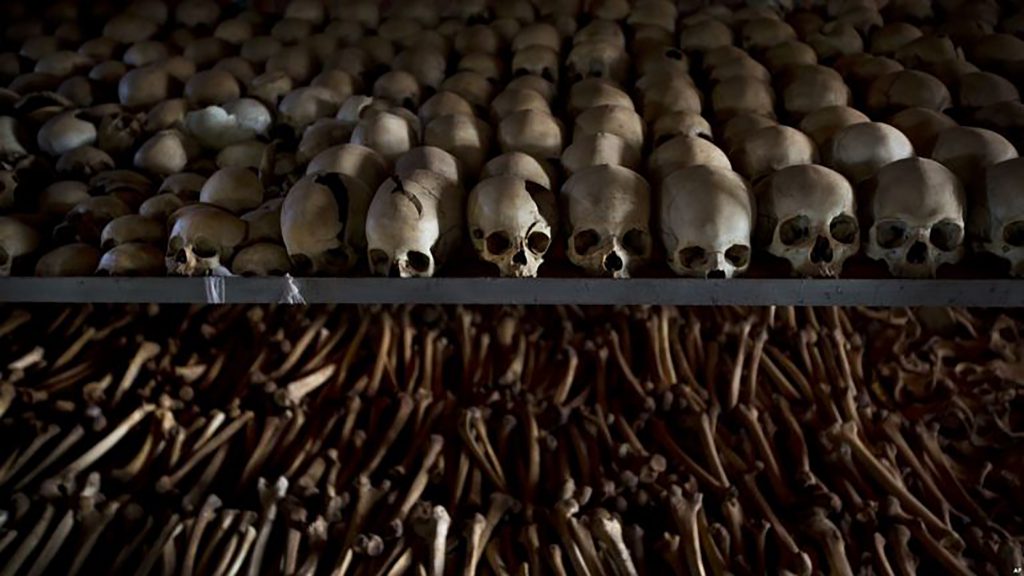In Rwanda there are two ethic groups: the Hutu, which makes up the majority of the population, and the Tutsi, the minority. Tensions between these two groups have been going on for years, so was not surprising that their conflicts would eventually escalate drastically. Despite their differences, they were actually very similar. The two groups have shared the same locations as to where they choose to live, the traditions they follow, and also the language that they speak. At a glance, they look very similar; but Tutsis tend to be taller and slimmer than the Hutus.

Hutu dislike for the Tutsi came about when the Belgians, who once dominated the region of Rwanda, considered the Tutsis to be superior to the Hutus. The Belgians gave the Tutsis better education, and even granted them better jobs than the Hutus. In 1959, a series of riots broke out in Rwanda. Many fled to Burundi, Tanzania, and also to Uganda.1 Unfortunately, 20,000 Tutsis were killed during the riots. In 1962, Belgium relinquished its power over Rwanda, and it was given its independence. The second President of Rwanda, Juvenal Habyarimana, who had been a dictator in power since 1973, and who was also a Hutu, began to lose popularity when the Hutus took over the government and the economy weakened. This is when Paul Kagame, a Tutsi, founded the Rwandan Patriotic Front (RPF) to try and overthrow the president. After much violence, the two sides, the RPF and Habyarimana, signed a peace accord in mid-1993. But on April 6, 1994, the President’s plane was shot down, killing both Habyarimana and the President of Burundi, Cyprien Ntaryamira; and things started to go badly wrong in Rwanda.
After the plane was shot down, the preexisting tensions between the Hutus and the Tutsis quickly flared up. No one knows who shot the plane down, but the Hutus quickly pointed the finger at the Tutsis. Conflict between the two neighboring tribes was nothing new in the central African nation of Rwanda, but the downing of the president’s plane was the final straw for the Hutus. Paul Kagame was accused by the leaderless Hutu government for being responsible for the plane crash and death of Habyarimana.2 Kagame denied this accusation and said that he had nothing to do with it, but news of the death of President Habyarimana spread across the country.
Shortly after the start of Rwanda’s genocide, Rwanda’s government initiated a campaign of retribution, and began to target Tutsis. In just hours, recruits from Hutu groups, government soldiers, and militias were sent to kill the Titus population, a Tutsi-minority tribe living in Rwanda. They were given radios to help them coordinate target groups of people. The recruits were sent into Tutsi cities where they started killing any Tutsi in sight with automatic weapons. For over the one-hundred days, more and more Hutus joined the killing squads, either by force of the government or voluntarily. They started to use machetes, spears, knives, and also masu, which is a thick club with nails sticking out of it. It even got to the point where everyday objects were used.3 They would have screwdrivers, bicycle handle bars, and hammers in one hand, and in the other a radio waiting to hear their next directive. They blew up churches where the Tutsi people were going into hiding to protect themselves, but the churches turned into death sites, trapping those inside when the churches were set on fire. Citizens of the Hutus were even being forced to go and kill the Tutsi people. They were given offers of food and money, and even told that could take the land of a Hutu if they killed them.

American President Bill Clinton did little to stop the massacre, even ignoring the obvious warnings about the killing that would take place after Habyarimana’s plane had crashed.4 Even other countries, like France and Belgium, along with the United States and the United Nations, knew what was about to occur, and wouldn’t take the initiative to try to stop it. For weeks these countries refused to use their moral and political authority to go against the genocidal government of Rwanda. The United States could have done much more to help out a country that was in need. Even a little bit of help would have been something, and maybe a significant number of people wouldn’t have lost their lives. While the American Congress was looking to the President to take action, Clinton was looking to the United Nations to take action. Since nothing was being done, sadly the killing just continued.
The only reason the genocide in Rwanda ended was because of the determination of the RPF. They fought back against the killing squads, and defeated the government’s soldiers. When they took control, Paul Kagame became the Vice President and Minister of Defense. With everything said and done, 800,000 Tutsi men, women, and children were killed from roughly 200,000 participants.5 There were 75,000 children that became orphans. Between 250,000 and 500,000 Tutsi women were raped, resulting in around 20,000 children being born as a result. The HIV virus and AIDS were used as another weapon, with 67% of the women that were raped being infected. If someone would have stepped up before this all unfolded, this would have been prevented and so many people wouldn’t have lost their lives or experience life changing events.
- Samantha Power, A Problem From Hell (New York: Basic Books, 2002) 342-347. ↵
- Samantha Power, A Problem From Hell (New York: Basic Books, 2002) 335-339. ↵
- Encyclopedia of Political Communication, 2008, s.v. “Rwanda Genocide, Role of Media,” by Frank Wittmann. ↵
- Samantha Power, A Problem From Hell (New York: Basic Books, 2002) 353-361. ↵
- Anna-Marie de Beer and Elisabeth Snyman, “Shadows of life, death and survival in the aftermath of the Rwandan Genocide,” Tydskrif vir Letterkunde vol. 52 issue 1 (Autumn 2015): 18. ↵



75 comments
Rolando Mata
this is a well-illustrated article about a subject I have never really read about before. I’ve never even seen films that discuss the Rwandan genocide so I personally found this article well done and informative. I was absolutely baffled at the immense dismissal the almost all countries had towards this tragedy. this tragedy of soldiers against citizens is exactly the type of thing that makes this well-illustrated article wholeheartedly gripping.
Dayna Valdez
I enjoy reading about the Rwandan genocide because not many people know about it. The genocide was very sad and to know that so many people lost their lives during it is even more sad. Before reading this, I had great knowledge about it and even saw a movie on it. Reading your article on the genocide was almost as if I was watching it all over again. I was able to have a clear image of exactly what occurred, why, and how.
Carlos Aparicio
Great article with much information Rwanda Genocide. During that time, many lives were lost due to conflict. I wish someone with a powerful voice came out at spoke what they believe. Maybe a peaceful climax could’ve been possible with the power of their voices. I really appreciate the descriptive details the author wrote regarding the Rwanda Genocide. This was a well-put article.
Deanna Lummus
This is really sad to hear. I didn’t even know this whole thing happened. I was much younger when Bill Clinton was in office but I do know that he wasn’t the best president we ever had either. It is sad to know that this type of genocide could still happen in such current times. Though this country is not identical to ours, it is still up with the times enough and I do not believe they fixed their economical problems by causing so many deaths. What happened to the orphans and kids who were born because of all the rapes?
Anthony Robledo
Your introduction does a great job giving me background information about the topic, but does not catch my attention sadly. What did catch my attention was the amount of deaths that occured in Rawanda. Can you believe this happened not so long ago, and the U.S choose to just ignore it. Its honestly horrifying. Despite reasons it still sad to see the U.S not stand up for what it believes. Great job!
Tara Sellers
Its really sad that this event occurred. I wonder why no one stepped in to help. To think that this event occurred not long ago is very startling. So many people’s life’s where affected by this event. If they hadn’t pointed fingers and listened I think the outcome would have been different. But they didn’t so a lot of people died because of it.
Joel Gracia
This article portrayed extremely gruesome events, but it was written in a way that kept me engaged from beginning to end. It is such a tragedy that discrimination to this extent still exists in modern day. It is disappointing that nobody was willing to stand up for what they saw as wrong, even though every other country surely viewed it as so. We can only hope our future generations are enlightened enough to avoid something like this happening again.
Sarah Mares
1. Upon reading this article, I gathered a lot of information that I had not yet known regarding the Rwanda Genocide of 1994. It was one of the most tragic genocides to be ignored during our time. The Hutus and the Tutsis saw many differences between each other, however, the Belgians did little to help the situation by giving the Tutsis more privileges than the Hutus. When the Hutus took over the government in retaliation, riots and mass killings started breaking out between the two tribes. After the death of President Habyarimana , more tension rose because the Hutus blamed it on the Tutsis. This continuous fighting between the tribes was left ignored by many great world powers including the United States. Consequently, 800,000 Tutsi men, women, and children were killed. I think this event was ultimately caused by European occupancy that started decades before this genocide took place. They made borderlines without the consideration of where each tribe was from, and they combined two different cultures together that were not able to work together. Overall, I really enjoyed the information this article provided and I feel like I gained much needed knowledge on this topic due to the specifications I read here.
Tyler Sleeter
Great article with very good information. It seems to me that if someone in power had acted before the tragedy occurred maybe it could have been prevented, but I suppose that is a pointless debate. For a trained army to attack civilians is beyond acceptable behavior in any sort of combat situation but for a world to look away while it happened is unfathomable. Most of these problems in Africa stem from colonization when countries were split up with no regard for tribal boundaries. After World War II, when the countries were allowed to govern themselves, things started to go very wrong and these battles between tribes became common. You have done a good job reminding us about the larger world around us and the problems within it.
Sebastian Castro Ramos
I had never before heard about the Rwanda Genocide, and what a terrible event it was. This is an example of how internal conflicts between groups within a country can escalate into a massacre like this one. I think this is a conflict that could have been solved through dialogue and understanding the other’s side, but I guess they didn’t resort to that because of the cultural difference between them and me. Maybe that is not their way of solving conflict. Great article!